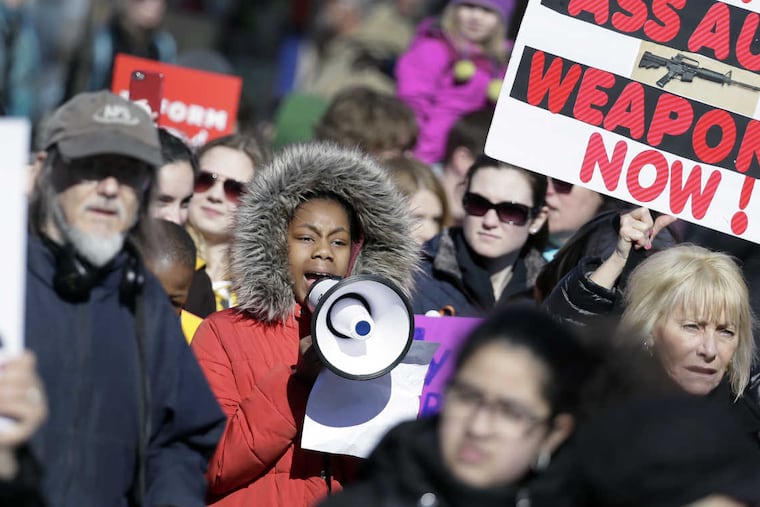At Philly's March for Our Lives, calls to remember that gun violence is nothing new
The message was clear among the 15,000 attendees and more than two dozen speakers at the city's anti-gun violence march: We must remember that black and brown communities have been fighting gun violence for decades.

When University of Pennsylvania freshman Rachel Steinig took the stage as the first speaker of the day at Philadelphia's March for Our Lives rally, it didn't take her long to start talking about the "racist and classist media coverage of school shootings."
"Through movements like Black Lives Matter, black youth have been fighting for gun reform for years and haven't been given the support and media coverage that the Parkland students have," she said to many cheers. "This is a problem."
It's a concern that's been voiced by students across the city, from Mastery Charter-Shoemaker to Parkway Center City Middle College, and the reason why many said they'd sit out the national school walkout on March 14 and Saturday's March for Our Lives — both of which were organized in response to the Valentine's Day massacre that left 17 students and faculty dead at Marjory Stoneman Douglas High School in Parkland, Fla.
>> READ MORE: March for Our Lives: Recap of gun control rallies in Philadelphia, D.C.
That gun violence is a reality black and brown students have been facing for decades was a prominent theme of Philadelphia's student-organized, crowdfunded March for Our Lives, one that several of the more than two dozen speakers made sure the audience did not forget.
There were performer Suzann Christine, who sang about victims of alleged police brutality Trayvon Martin, Eric Garner "and even a girl named Sandy," noting that gun violence intersects with many issues that the black community faces; 16-year-old Saamiya Muhammad of Olney, who said, "Where I live, gun violence is the most prominent sport"; and Camryn Cobia, a Central High School student and member of the Philadelphia Student Union, who affirmed that she stood in solidarity with the Parkland students but reminded the audience – 15,000 by organizers' count – that black and brown youth have been coming together to find solutions to gun violence for years.
There were also reminders of gun-violence victims among the marchers, as women carried portraits of young black men. Among them was Shakira Fagan of North Philadelphia, who said she joined the demonstration to make sure that her son, Irell Williams, who was shot to death when he was 17, was not forgotten.
Other prominent themes were outrage at the influence of the National Rifle Association on elected officials, what many described as misdirected emphasis on mental health instead of gun control, and the importance of voting. Dozens of organizers with groups like Philly Young Democrats and OnePA roamed the crowd in hopes of registering people to vote.
During the 2½-hour program featuring high school and college students, politicians, hospital workers, and musical performers, speakers seemed to be putting their elected officials on notice.
"We are here today because we remember and we will be here in November," student Brooke Dowling repeated over and over, addressing Sens. Pat Toomey (R., Pa.), Mitch McConnell (R., Ky.), and "NRA puppet" Marco Rubio (R., Fla.).
Temple sophomore Benjamin Aitoumeziane's message to elected officials who don't support gun control? "Start packing."
Ethan Block, a high school sophomore and student organizer of the march who roused the crowd as if he had been giving speeches at rallies all his life, said that when it came to politicians who don't support the movement: "We will do everything we can do to make sure you never set foot in congressional office again."
Among the politicians who spoke were Sen. Bob Casey (D., Pa.), Attorney General Josh Shapiro, a Democrat from Montgomery County, and State Rep. Brian Sims (D., Phila.). Sims decried the "false superiority of white men" and encouraged the white men in the crowd to "step out from the ignorance our privilege affords us."
The march, which began at Fifth and Market Streets and snaked down Columbus Boulevard to Columbus Circle, featured many young families, with parents pushing strollers, pulling wagons, and carrying toddlers on their shoulders.
It was the third march for the Hancock family – parents Christine and Ian, and sons Logan Stout, 11, and Colin, 8 – of Telford, a suburban community straddling Bucks and Montgomery Counties.
"I want to stop danger in schools," Logan said.
Some spoke of the hope they felt in seeing the youth lead this movement.
"It's the first hope I've had since you know when," said 67-year-old Aliceanne Manning, of Germantown, who, along with her friend Laurel Sweeney, 65, held a sign that many stopped to take photos of. "Grannies against guns," it read.
Organizer Romaine Wright said she didn't know if the organizing crew would do another march next year — it was too soon to say — but they wanted to make sure the conversation kept going, whether at town halls, meetings, or something else.
And while some will criticize the newcomers to this issue, wondering where they were when black and brown people were getting gunned down, Scott Charles, director of Temple University's violence-prevention program Cradle to Grave and a professed "old head" who knows gun violence is nothing new, said it's not the time to be divided.
"I'm a firm believer in, 'It's not where you've been, it's where you're at,' " Charles said. "And right now, you're here."